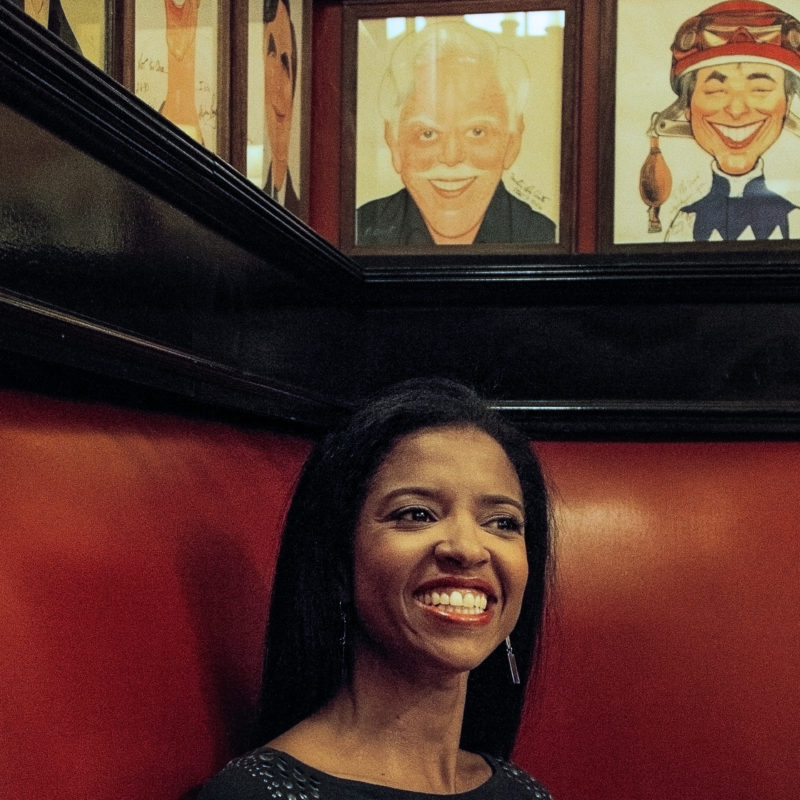An Interview with Renée Elise Goldsberry
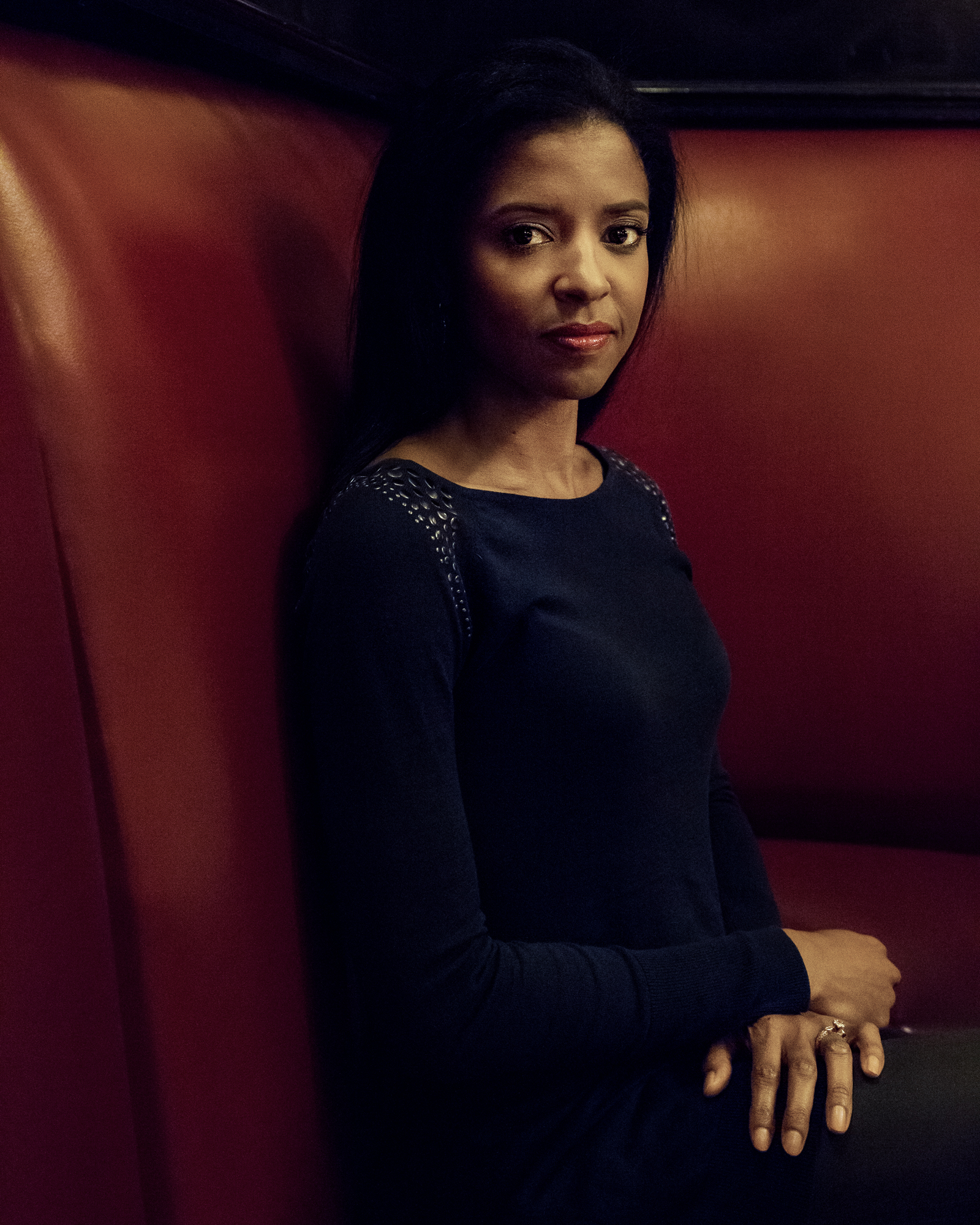
Written by Victoria Myers
Photography by Emma Pratte
April 26th, 2016
For four days in July of 2013, Renée Elise Goldsberry starred in a musical with music, lyrics, and direction all by women. It was the inaugural year of Encores Off-Center, and the musical was the feminist classic I’m Getting My Act Together and Taking It On the Road. In it, Renée was on stage for the entire show giving a dynamic and layered performance as a singer wrestling with questions of how to be an artist, how to balance life, and how to evolve. Renée’s other theatre work includes starring in Good People at Manhattan Theatre Club, Two Gentleman of Verona at Shakespeare in the Park, and the original production of The Color Purple (just to name a few). She also has—for a few more episodes, anyway—a recurring role on The Good Wife. And, for the last year, she has been starring as Angelica Schuyler in Hamilton, a musical everyone has probably heard of. Three years after I’m Getting My Act Together, we meet Renée at Sardi’s to discuss Hamilton, but also so many of the themes of that first Encores show: the process of being a performer, how to deal with success, and how to continue to let life happen during times of acclaim and times of challenge.

I wanted to start by talking about your acting process. When you see a character on the page, where do you begin?
Really just with the words and the intent of the writer. I think actors, by nature, are pleasers, so I think our first instinct is to want to fulfill the vision of the writer and director and, at the same time, bring ourselves to it. I often hear people say, “He’s just playing himself,” like that’s not what we’re trying to do, and I have no shame at all in saying that I’m trying to find the part of me that is that character. So there will be similarities between characters that I play because there will be things that work for more than one character. I think the more intimately you know a character, the less of you you’re trying to censor. There’s not a part of my day or my experience that I don’t think can serve any character I play.
The point is to be an individual, and that’s why people get hired.
Right. Absolutely. I think the best kind of training highlights what’s individual and unique about you. And the worst kind of training tries to make you sound like something else. Your regionalisms, your quirks, your insecurities—[these] are all things that make you interesting as an actor.

Something that I’m obsessed with asking actors about is, in an industry where you’re always being “typed” and told what you’re good at and not good at, how you develop as an individual and figure out who you are?
I’m always having debates with actors about feedback. I’m 100% against getting feedback about auditions, I’m 100% about getting feedback from directors and when you’re working with people. But in terms of you going out for roles, it’s your job or it’s not, but I don’t need information about why it didn’t happen. Because most of the time, there’s nothing that’s true about what I’m going to hear, especially by the time it gets back to me in the game of telephone. I honestly believe it’s either your job or it’s not, and all the rest of that work trying to find out, “Was I funny enough? How did I do in that moment? Was I this or that?” It’s not helpful. As actors, it’s destructive because we give it too much weight.
Have you always felt like that, or was that something that developed over time?
I think I’ve always felt like that. I think you have to be very particular about who you get feedback and criticism from, and there are certain processes you don’t ask for feedback for and one of them is an audition process. And I think a lot of that—what type are you, she’s too tall, too short, whatever—all of these things are qualities you have as a human being, and they’re things to be celebrated. Even if they don’t necessarily get you a particular job, they are things that are particular to your DNA and will get you the right job. And to think that there’s anything wrong with how you came across at any one moment is unhelpful.

Do you come into rehearsal with a lot of work you’ve done at home, or do you wait and see what everyone else is going to do?
I come in with a really open mind and as prepared as I can be, but that [preparation is] really just going to be investigation of the world, which is going to be about having read it [the script] and seeing whatever that did to me and my ideas of who the person is. And then I’m showing up to see what works. Depending on the amount of time the [rehearsa] process is will depend on the work I’ve done [on my own]. Like if I’m doing I’m Getting My Act Together [and Taking it on the Road] in one week at City Center, then I come in and I know everything. I like preparation because it’s the only thing you can control. And there’s some assurance in that later, if it doesn’t go well, the odds are less that I’m going to beat myself up if I’ve done all the things I personally could have done to prepare.
Do you find your process changes for a long run like you’re doing now in Hamilton?
That’s one of the unique things about working in theatre, especially a show that runs a long time. First, you have to figure out how to do something, and then you have to figure out how to keep doing it in a way that’s fresh and interesting. It’s like something that’s adhered to you like tape or a band-aid—the more you pull it off, the less adhesive it is. So those first times you’re experiencing emotion in a show, sometimes those first times can be really scary to do, and also, probably, very powerful to see. And on that journey you get more facility with it, so whatever fear you might have subsides, so you can enjoy the emotion of it, but then, as you move along, there are some surprises and gut-wrenching reactions to things that dull. So then, your journey is to relax into whatever muscle still remembers those things, and allow whatever is present in that particular moment to work. It’s one of those things in a process that you just keep discovering and learning how to do. One of the most important things is not trying to recreate something—that’s the only bad thing about having done something for a long time. Clearly, you’ve had some horrible moments and you can learn from that, but unfortunately what you can’t learn about things gone well is how you got there, because it will never work twice.
Is that particularly true when you’re in something so popular and that’s getting so much attention? Do you have moments of, “Oh god, I have to make sure that people aren’t disappointed”? Does it make it harder to have the mental freedom to relax into it?
I think it doesn’t matter what it is or what people think in terms of how much they love the show. It’s just a truism that something that worked one night live does not work the next night, for me—maybe it happens for other actors. It might just be the fact that I’m trying to create something as opposed to experiencing a moment. I can say something at the exact same time, and if I’m going for a laugh, I’m not going to get it. Or if I’m trying to make myself sad. That’s just not how we work, that’s not how I work. I think the strongest people are really okay with not feeling anything. If I come out, and I don’t feel anything, it’s okay. The words are enough, what’s happening here is enough. What I’m learning is that just because something feels great to do [as an actor], it doesn’t mean it’s any more impactful to the audience. That’s one thing you learn when you’re in a Hamilton. That’s the beauty of being supported by such a strong structure. You have nights where you feel like you’re brilliant and nights where you feel like you were a fraud, and people you respect will be equally as moved because the piece is that strong.
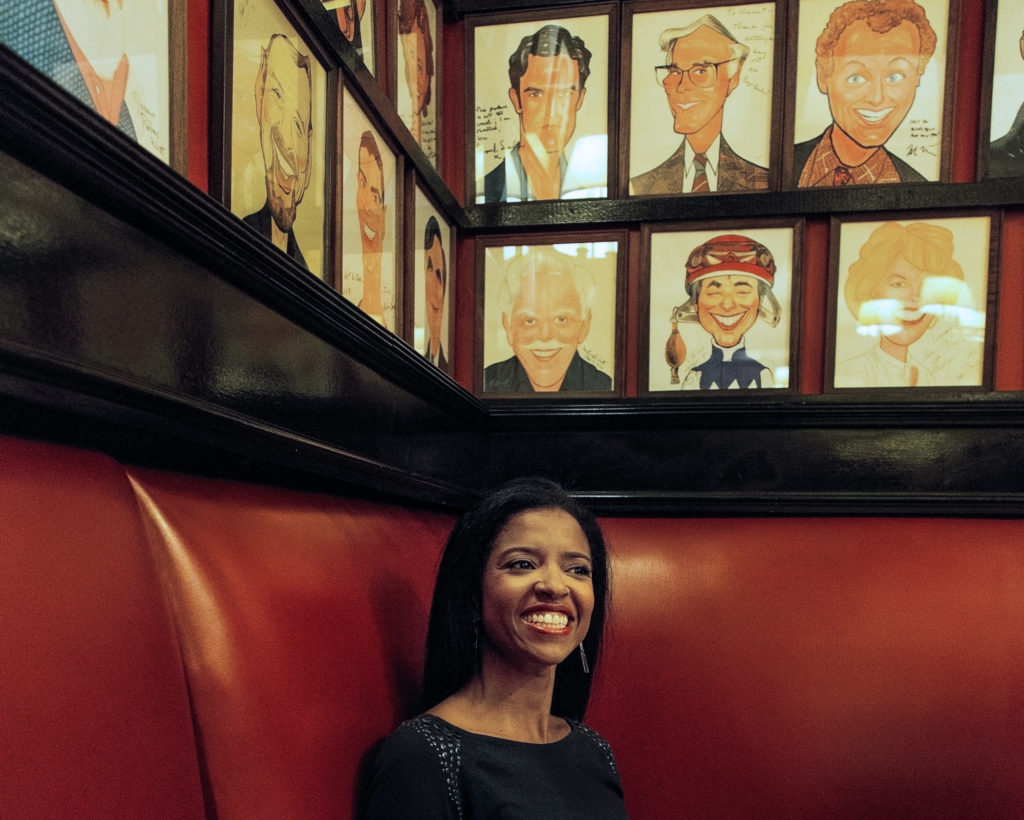

The subtext in Hamilton doesn’t function the same way as in a lot of contemporary drama. It’s more of a Greek or Shakespearean structure. Did you have to adjust your process at all because of that?
It’s interesting to think of it that way. I’m not aware of feeling different doing this as an actor then doing Good People or As You Like It. There’s so much that happens subtextually in the way we think and talk. And we do tell you a lot. We have the luxury of that vehicle and being able to say so much of what’s going on in our mind, but there’s still so much that’s going on in our mind. It’s a good question for this piece since for Angelica there’s this one sequence of events that you see happen, and then you see it happen again from a different perspective. As an actor, even when playing it from the perspective of another character, you’re still having the same experience, even though the next time we do it I’m going to tell you what I was thinking. But I’m still having that experience the first time. It’s fascinating and an interesting journey.
Do you think having worked in television and film is helpful with that, since those mediums deal in perspective more?
I do feel like as an actor, regardless of my role, everything is from my perspective. It’s frustrating, because sometimes the storyteller is not telling it from my perspective. I think I learned from my four years on a soap opera [One Life to Live] that I’m always going for the rooting factor for my character. That’s the strongest on a soap opera, since a lot of the time they’re serving a big plot idea—so and so goes blind—they have to sell. But my job is most secure if you’re involved and invested in my character, so I have to fight for my character and pull off your idea. And so, even if you have my character do something horrible or say something that I don’t think makes a lot of sense, I still have to do it in a way where I’m defending my character and you’re going to root for her or at least understand her. That muscle gets really strong in certain mediums, and it doesn’t go away when you’re playing Angelica and you’re madly in love with your sister’s husband. I’m never going to play a villain. Or if I’m Geneva Pine on The Good Wife and my job is to come in and harass the protagonist, on some level it’s Renée, and I’m trying in some way to justify her to the audience.

Being in something that’s so successful, there are all the obligations that come with that. Have you had to think more about your boundaries?
It’s strange the kinds of things I’m not doing or saying no to. It’s kind of bizarre. I was just having lunch with Tommy Kail, our director, and he was helping me decide if I was going to say yes to a project, and since I wasn’t going to say yes, how to do that in a way that is appropriate. We kind of laugh like, “What is our life?” And I think that’s just the nature of “it” moments in your life. I’ve spent a long time in my career watching things like this happen for other people, and one of the most awesome parts of being in this business for a long time is just the proximity to really exciting things happening to really wonderful people. And even just from watching A&E Biography growing up my whole life, I was well aware that it’s often not evenly distributed. It’s a lot like the ice bucket challenge [where people were dumping buckets of ice over their head for charity], and that is what success can feel like—one big ice bucket challenge. And there can be frustration in that, since I’m well aware that next week, or three months from now, I’ll have all the time in the world, but this week I can’t [do something] even though I want to do both. But there’s something mature and responsible about boundaries and knowing that I’m only human, and knowing that my first job is to be a mother to my kids, a wife to my husband, and loyal to the job that’s the reason why someone might want me to show up and do something else. That light over there is exciting and shiny, but I said I would show up to my show every night, and I have to be rested enough to do that. So those kinds of choices I marry with wanting to miss as little as possible.
Do you feel like it’s harder to get people to respect your boundaries as a woman? It comes up fairly frequently in interviews that women feel they have to say things with a smile.
I’m sure that’s true. In my twenties I was in a long distance relationship for many years, and he was a great guy and good friend. One of the things that was most valuable about it was that it allowed me to live as a single woman in Los Angeles and have a lot of friends who were guys who were not offended that I wasn’t going to date them because I had a long distance boyfriend. It was a way to say no without any personal offense. I don’t know if it would have been easy to have those friendships, if I had not had this thing that had nothing to do with them that was the reason we weren’t hooking up. I tell you that because it’s one good thing about being in Hamilton right now. It’s something people understand—saying no because you’re in Hamilton. It’s probably the best excuse in the world to not do [something].
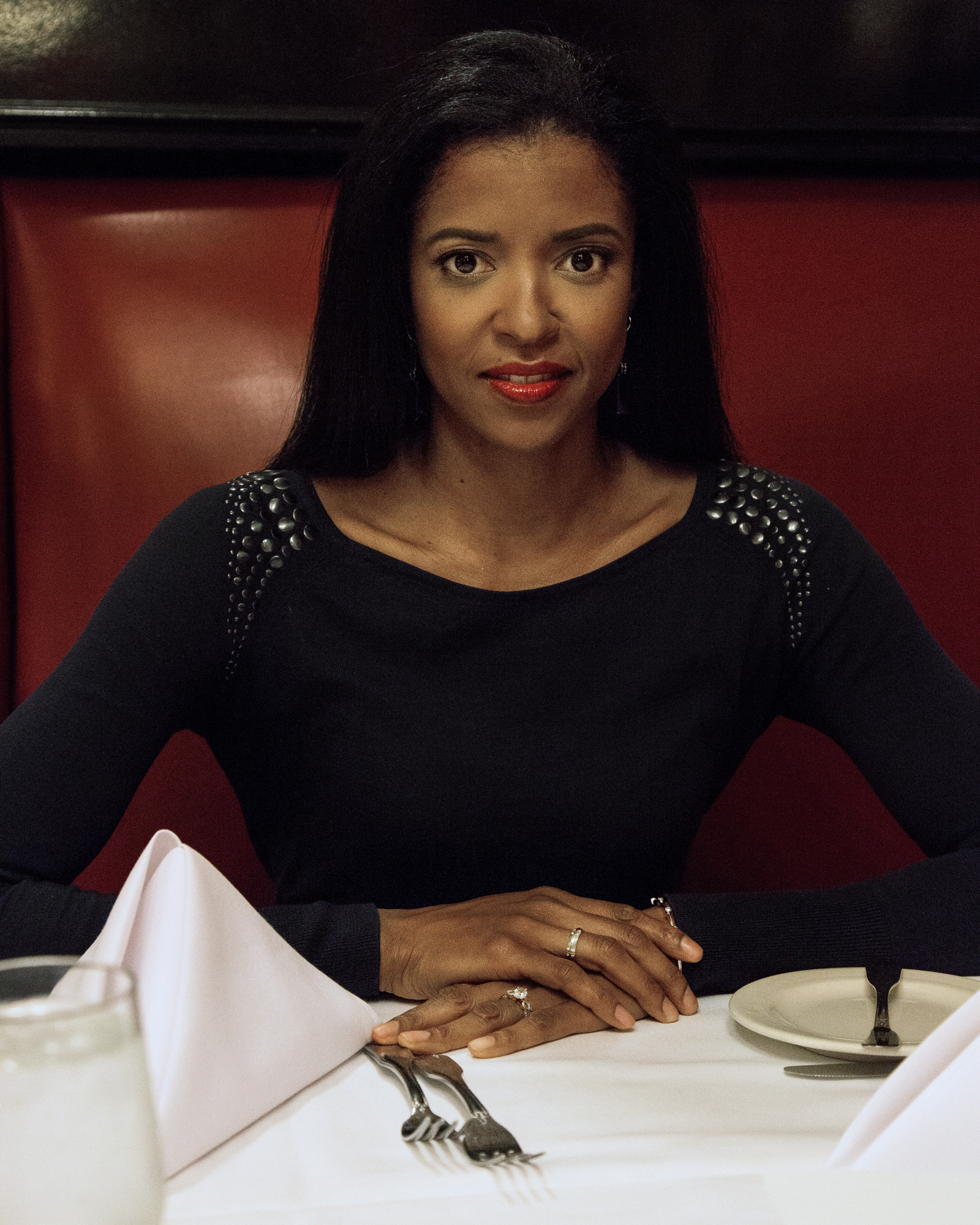

As the leading lady of the company, how much thought did you give to what type of presence you wanted to be backstage to help lead the company?
I believe that we don’t get these opportunities so we [can] win huge awards and everyone thinks we’re great. I think we get these opportunities, and are graced with the talent to get in the room, so that you can have the relationships you have with the people you get to work with. That’s what I’m doing there. We get to star on Broadway, and that’s wonderful and I’m very grateful for anything that comes with that, but I feel like my purpose is to love the people I’m around every day. I really believe that. In this moment even, I feel like it’s about something I might say that would be of value to you, or something you might say that would be of value to me. We’re doing an interview, but it’s about being there for other people. What I do grants me access to a specific group of people and an intimate situation where we get really involved in each other’s lives in a way that can really be impactful, and if I ignore that moment because I’m saving my energy for being on stage, I’ve missed the point.
I think something people maybe don’t know about theatre is how much the atmosphere backstage is really determined by the actors.
Oh yeah. And what’s interesting is the atmosphere on stage is most affected by the relationships off stage. That’s what chemistry is. When you come see our show, you’re seeing a group of people walking around each other, rapping and singing and telling a story, that are really in love with each other and dependent on each other to pull it off each night, and that’s as interesting to see as this brilliant story that Lin-Manuel Miranda wrote. That’s what’s so awesome with having him in it. The first love affair that happens for me is with Lin, the actor who I get to play with, and the second is, “You’re a genius, thank you for casting me.” But the first is that we’re in each other’s worlds and I can be in love with his kid and his wife and whatever crazy thing he just said. And that’s how I feel about the women who play my sisters. And that’s how I feel about the ensemble. I can do the job because they believe in me. That’s huge. Before I knew I could do this, they did, and that gives me the confidence to do it.

You have kids. Is there something you think the theatre community can do to improve things for people who are trying to balance working with having kids?
I think what’s challenging is that you can’t put your kids to bed at night. I don’t know what actual rules are in place, but I’ve never worked any place that I didn’t feel supported in terms of having children. A couple of times I’ve had to bring my kids to work, and no one has ever said anything about it. My kids always want to come to work because it’s like a party. I feel like it’s a very friendly place for families and mothers. Even when I had my son and I was breastfeeding, I was doing a workshop at Playwrights [Horizons] and they were like, “There’s a room back here for you to pump.” I was pregnant in The Color Purple, and they were extremely supportive. My challenge was the decision to try to have them, and timing, and auditions. That was always hard for me. I’m trying to get pregnant and [feeling like], “I don’t know if I can say yes to this.” That kind of disclosure about what I was trying to do was such a challenge to me. I found myself having all kinds of conversations with people like, “So I really want to do this, but I also really want to have a baby. And I might have to do IVF, I’m not really sure. I’m not really sure what the timing is going to be. Can you help me?” It was so awkward trying to figure out how to have both things. But I’ve never found myself in a situation where someone has been unloving or not supportive.
The more people talk about all the aspects of it the more helpful it will be.
I think we should keep talking about it, because I don’t know if women know that there’s still work when you’re pregnant, after you’re pregnant, when you’re a mom. Can you still be an ingénue when you’re a mommy? And the answer is, yes, because I am.
The term ingénue is so weird to begin with.
It is. But it’s one of my favorite things in the world to do and be, and it’s one of the things I think I’m best at. And I’m grateful that at my age that people will cast me to do it. I was just saying this to one of my girlfriends who was in town from Los Angeles, and her daughter and son are both in the business, and she mentioned that her son had just aged out of a certain campaign because he was too tall and she was like, “He aged out. Aw man!” I was like, “You can’t let him hear you say that,” because I think one thing we have to watch out for in this business is, anything that naturally happens to us as we get older, as we become women or men, is to think that any of those things that naturally happen to us are bad. That’s the challenge and the unwritten thing that you’re always dealing with. “Oh my god, I’m going to get hips.” “I’m going to gain weight when I’m pregnant.” “If I’m married, am I only going to be this?” “Can I tell someone that I’m married?” There are all of these things. You have to decide that you’re still going to live your life. The height of success is not the same thing as personal success, and personal success feeds professional success and trust that you’ll still have a Hamilton.

Do you have a spiritual life and does it affect your work?
Absolutely. 100%. I’m such a strong Christian. I 100% believe in God. I don’t believe I could do anything outside of His strength. I feel like it’s such a gift every single day. I think that there’s something about disappointment and loss that we know we can look to spiritual life for, but I also think there’s something about huge success that I feel even a stronger need to have a spiritual life for. I think everyone, no matter how much people acclaim them, feel that they don’t necessarily deserve it. And when you’re in something like Hamilton, and you’re about to do something every single night that people think is awesome and huge, and you might not think that you can pull it off again, there’s something really awesome in knowing that I didn’t pull it off the first time by myself, so I don’t have the pressure, by myself, of doing it again. That gives me a tremendous amount of peace and confidence. And I’m also really excited about the fact that I know who to thank for every wonderful thing that happens. I’d be kind of lost if I didn’t know where to send gratitude. That’s been a huge source of strength for me.
One of the weird things with success is that it can bring a whole other set of challenges.
It takes a tremendous amount of energy to try to enjoy and really be responsible with all that might come to you in one moment. It takes a tremendous amount of stamina. There are a lot of days where I’m like, “I don’t even want to know the long list of things that I have to do today, since in this moment I don’t have enough strength, enough answers… to pull this off till 11pm tonight.” And the value of a spiritual source is that I am aware that I don’t have to have enough strength personally, I’ll be given what I need in the moment.
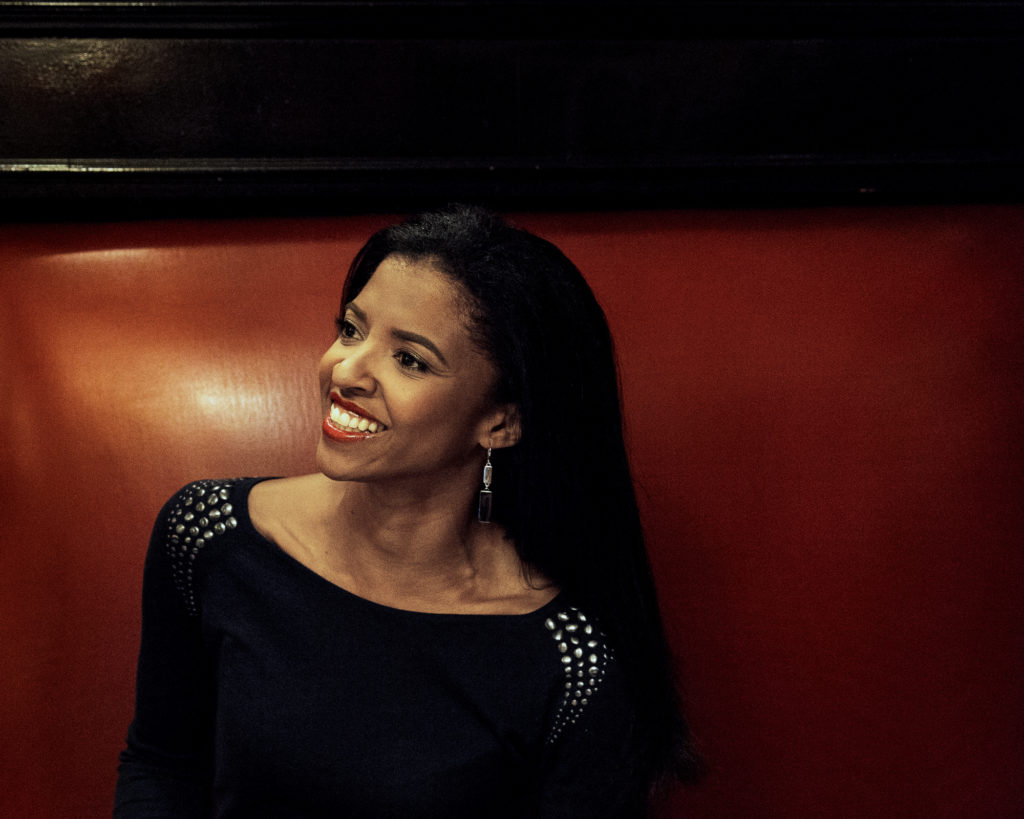

You’ve worked on new plays and new musicals. Is there something you think can be done to develop new work better?
I think our union is doing a really good job of talking with producers about what we need to keep producing really wonderful work, and to fund and inspire the artists like Lin and David Lindsay-Abaire and all of these wonderful people. And there are also a lot of wonderful conversations that are happening about how to recognize the actors that are involved in the projects as well. That’s one conversation that we’re having now and want to continue having—how to do both, because there’s not one side to that conversation. We all really need each other. So I’m just grateful that we’re at a moment where we have a reason to talk about all of the things that are percolating in theatre. I’m looking around Sardi’s, and I’m living at a time where I get to work with someone who deserves to have his face right there. Our generation is producing heavy hitters. We don’t have to look back to the golden age to find people who change the world. And we should do everything we can to make sure there are rooms all over New York City that are on fire and kindling all of these great ideas. That’s why you live in New York. Anything our community can do to support that in a fair way, so it can continue, I’m down for.

What’s something you think can be done to improve gender equality in theatre?
We can go see Eclipsed and keep them on Broadway as long as possible. There’s absolutely no reason they shouldn’t be on Broadway as long as Hamilton. We can go see Waitress. Unfortunately, it doesn’t really matter what you say, it’s where you spend your money and your time. That’s the currency that’s calculated and dictates what happens next. I think we need to support the women who are writing and directing and acting and singing—and female protagonists. The better those shows do, the more shows are going to be made, because this is America and capitalism is going to be what dictates what comes next. Go find out the things that are happening that you want to support. We talk a lot about the diversity of the cast [in Hamilton], but what we don’t talk about is that they didn’t stunt cast it, they just cast it, and that means a lot to me. I think that something that’s wonderful should be successful because it’s wonderful, and not because it’s starring the Renée Goldsberry who has won ten Grammys or ten Oscars or whatever I’d have to win to open a show by myself. To me, what is even braver than casting a bunch of brown people in a show about the Founding Fathers is that none of them were superstars, and because it works maybe they’ll do it again. It’s the same thing with women in plays and movies—if it works, and people pay money to go see it, they’ll do it again.
You can follow Renée on Twitter: @reneeelisegolds and Instagram: @reneeelisegoldsberry.

